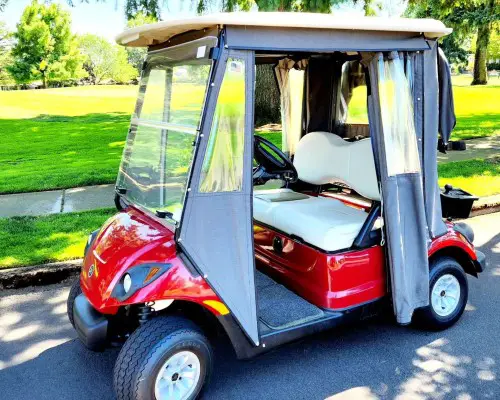
Yamaha golf carts stand out in versatility and style, catering to diverse user needs.
These carts blend seamlessly into golf courses and community roads alike, offering both comfort and efficiency. However, every choice has its pros and cons.
This introduction explores those aspects, aimed at decision-makers from golf enthusiasts to community residents seeking mobility solutions. 🌿🏌️♂️
Pros of Yamaha Golf Carts
1. Advanced Technological Features
Yamaha leads with QuieTech EFI technology. This innovation reduces noise, making Yamaha carts the quietest gas models.
Coupled with an independent rear suspension, it ensures a smooth, quiet ride. A standout feature for those valuing tranquility on the course.
2. Eco-Friendly Models
Yamaha’s commitment to the environment is evident in both their Gas and electric models.
The EFI (Electronic Fuel Injection) technology reduces noise and significantly cuts emissions compared to traditional gas carts.
On the other hand, Yamaha’s electric models offer a zero-emission alternative, ideal for those looking to minimize their environmental footprint.
3. Comfort and Ease of Use
Designed with comfort in mind, Yamaha carts feature spacious interiors and ergonomic controls.
Including a ClimaGuard Top with dual gutters demonstrates Yamaha’s attention to passenger comfort, protecting against rain more effectively than standard designs.

4. Customization Flexibility
Yamaha offers a wide array of customization options. From color choices to accessories like cooling fans and club washers, these carts can be tailored to individual preferences.
This flexibility enhances the overall user experience, allowing for a personalized touch.
5. Wide Range of Models
With its varied product lineup, Yamaha caters to individual and commercial applications alike.
Models like the Drive 2 PTV and UMAX series offer options for golfing, off-roading, and utility tasks, ensuring there’s a Yamaha cart for every requirement.
6. Superior Engine Performance
There is no doubt that Yamaha engines are highly efficient and powerful. Their golf carts offer exceptional climbing ability, crucial for hilly terrains.
This performance is consistent across both gas and electric models, ensuring reliability and robustness in various conditions.
7. Strong Resale Value
Yamaha’s reputation for quality and durability contributes to strong resale values. Their golf carts are built to last.
As a result of this longevity and brand prestige, ensures that Yamaha carts retain their value over time.
Cons of Yamaha Golf Carts
1. Potential for Rust in Steel Frames
Yamaha carts with steel frames face rust challenges, especially in humid conditions or when exposed to salt.
Regular maintenance can mitigate this, but it remains a concern for longevity and aesthetics.
This issue underscores the importance of choosing models with corrosion-resistant treatments or opting for aluminum frames when available.

2. Compatibility Issues with Accessories
Customizing Yamaha carts with third-party accessories can sometimes lead to compatibility issues.
While Yamaha offers a wide range of customization options, integrating non-Yamaha parts or upgrades requires careful consideration to ensure compatibility, potentially limiting the scope for personalization.
3. Parts Availability
Finding specific parts for Yamaha carts can be challenging, particularly for older models or less common variants.
While Yamaha’s network and dealer support is extensive, there may be delays or difficulties in sourcing certain parts, impacting maintenance and repair timelines.
Final Thoughts!
Yamaha golf carts offer a blend of innovation and environmental preservation, setting a benchmark in the golf cart industry.
Their commitment to reducing noise and emissions while offering customizable and comfortable rides caters to a broad audience, from golf players to eco-conscious community members.
However, considerations such as the potential for rust, accessory compatibility, and parts availability highlight the importance of weighing individual needs against these challenges.
Ultimately, if you prioritize technological advancement, eco-friendliness, and customization, Yamaha stands as a compelling choice.
FAQs
Where are Yamaha golf carts made?
Yamaha golf carts are manufactured in Newnan, Georgia, USA. This facility ensures high-quality production standards. The location reflects Yamaha’s commitment to excellence and innovation in the golf cart industry.
What is the top speed of a Yamaha golf cart?
Yamaha golf carts typically reach a top speed of 19 mph. This speed ensures a balance between efficiency and safety on the course.

Bob is a golf equipment expert with a wealth of knowledge about the latest and greatest golfing gear. Bob is our Lead Product Reviewer and provides in-depth reviews and recommendations on the best equipment for golfers of all levels. He takes a hands-on approach to testing, using his extensive experience on the course to provide the most accurate and reliable product recommendations. Join Our Team!
